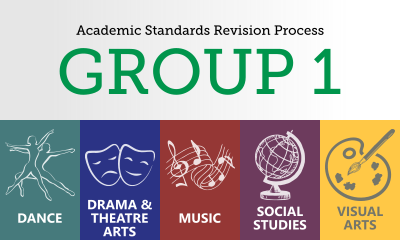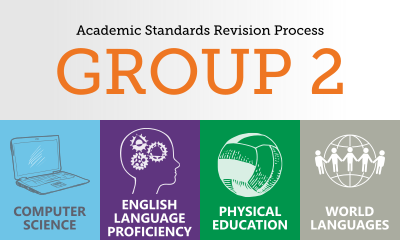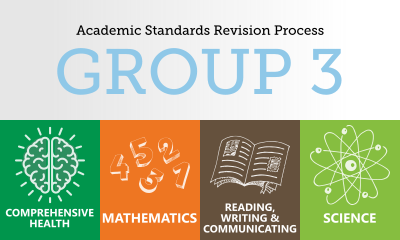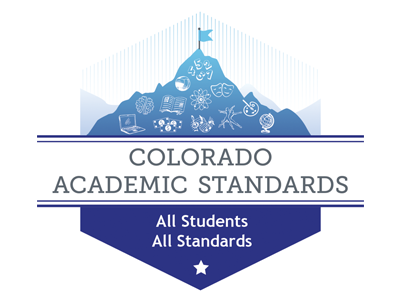You are here
Colorado Academic Standards Review and Revision

The Colorado Academic Standards describe what students should know and be able to do to prepare them to be active citizens and successful in higher education and/or the workforce. A group of content area standards undergoes a review and revision process every two years. This page gives an overview of the review and revision process.
News and Announcements
High School Mathematics Revision Update
The revision of high school mathematics standards is underway. Visit the mathematics revision page to see the committee roster, their meeting schedule, and the released documents they are using to inform their work.
Science Standards Revision Approved
At the August 2025 State Board of Education meeting, the board approved revisions to the K-12 Colorado Academic Standards for Science to make targeted revisions to strengthen coverage of climate science in the K-12 standards. The revisions will be implemented in the 2027-28 school year.
Standards Revision Cycles and Current Status
Colorado reviews and revises its academic standards every six years, with about a third of the content areas being revised every two years.

Group 1 (Adoption Years 2022, 2028, 2034, ...)
- Content Areas: Dance, Drama & Theatre Arts, Music, Social Studies, and Visual Arts
- Current Status: All content areas were revised and the State Board of Education approved all revisions in 2022. As of 2024, CDE considers these standards fully implemented.
- Future Action: Group 1 content areas will again be considered for revision in late 2026 or early 2027, with those revisions to be completed by the summer of 2028.

Group 2 (Adoption Years 2024, 2030, 2036, ...)
- Content Areas: Computer Science, English Language Proficiency, Physical Education, and World Languages
- Current Status: The State Board of Education voted to revise and expand the computer science standards to include Grades K through 12. The State Board also chose to re-adopt the physical education and world languages standards without any changes. The Group 2 standards were approved by the State Board in 2024.
- Future Actions: CDE advises schools to implement these revisions by 2026. The next revision cycle for the Group 2 content areas will begin in late 2028 or early 2029, with those revisions to be completed by the summer of 2030.

Group 3 (Adoption Years 2026, 2032, 2038, ...)
- Content Areas: Comprehensive Health; Mathematics; Reading, Writing & Communicating; and Science
- Current Status: The Group 3 standards are currently in revision. In December of 2024, the State Board of Education voted to revise the high school mathematics standards and make targeted revisions to the science standards to address climate change. They chose to re-adopt the comprehensive health and reading, writing and communicating standards without revisions.
- Future Actions: A committee is drafting revisions to the mathematics standards and CDE is drafting selected revisions to some science standards in response to stakeholder input. All Group 3 revisions are to be completed by the summer of 2026.
Group 3 Revision Details
The standards for mathematics and science are currently under revision. The State Board of Education voted to re-adopt the standards for comprehensive health and reading, writing and communicating without any revisions.
Mathematics
![]()
The State Board of Education voted to revise the high school mathematics standards at their December 11, 2024, meeting while keeping the P-8 standards the same as those adopted by the board in 2018. A review and revision committee will recommend standards for the board to adopt before July 1, 2026.
Science
![]()
The State Board of Education voted at their December 11, 2024, meeting to make targeted revisions to the science standards to address climate change. On August 21, 2025, the board approved revisions to the K-12 science standards. Visit the science standards revision page for information regarding the revisions.
Comprehensive Health
![]()
The comprehensive health standards adopted by the State Board of Education in 2018 were re-adopted with no revisions by the State Board of Education at their December 11, 2024, meeting. Barring any further action by the board or the legislature, these standards will remain in effect until the 2032 revision cycle.
Reading, Writing and Communicating
![]()
The reading, writing and communicating standards adopted by the State Board of Education in 2018 were re-adopted with no revisions by the board at their December 11, 2024, meeting. Barring any further action by the board or the legislature, these standards will remain in effect until the 2032 revision cycle.
How Colorado Revises Its Academic Standards
The Colorado Department of Education follows six principles for standards revision. CDE believes a standards review and revision process should be:
- Transparent: Decisions and processes for the standards review and revision will be public.
- Inclusive: The review process will include substantial and frequent opportunities for the public to weigh in.
- Research-informed: Recommendations will be based on research.
- Consistent: The review and revision process will be consistent with state law and past standards reviews.
- Substantive: The review and revision will focus on the substance of the actual standards.
- Improvement-oriented: The focus will be to improve what exists today rather than start from scratch.
The standards review and revision process includes five steps outlined in the figure below: (1) planning and approval, (2) research and resource development, (3) standards review and revision, (4) revision approval, and (5) communication and dissemination.
Colorado Academic Standards and the Law
The laws that govern Colorado's Academic Standards exist in Colorado Revised Statutes Title 22 (Education), Article 7 (Accountability), Part 10 (Preschool to Postsecondary Education Alignment). These statutes date back to 2008 when Senate Bill 08-212 was passed, known as "Colorado's Achievement Plan for Kids," or "CAP4K." Statutes prior to 2008 led to the creation of Colorado's original Model Content Standards in 1993, and the current CAP4K statutes continue to be revised by the legislature and implemented by the State Board of Education and CDE.
C.R.S. 22-7-10 defines a standard as "a clear, measurable, learning target for what a student should know or be able to do relative to a particular instructional area." In Part 10's legislative declaration, the general assembly finds that "standards-based education must consider the needs of the whole student by creating a rich and balanced curriculum" and that it must be the goal of standards to prepare all students for active citizenship and success in higher education and/or the workforce. The general assembly also finds that creating a "seamless system" of standards is a "complex project that will require multiple stages of planning, design, and implementation and that will likely continue over years."
Most of the statutes specifically about standards are in C.R.S. 22-7-1005. These statutes describe which content areas will have standards, including specific content related to mental health, media literacy, Holocaust and genocide studies, and financial literacy. These statutes also require the State Board of Education to adopt and revise standards in staggered six-year cycles, with a third of the standards being up for revision every two years. With each revision, the State Board must ensure that standards are aligned with postsecondary and workforce readiness and comparable in scope, relevance, and rigor to the highest national and international standards.
C.R.S. 22-7-1010 requires the State Board of Education to engage stakeholders in adopting and revising the state's educational accountability system, including academic standards. This includes meeting with interested persons throughout the state, soliciting information from schools and school boards, and collaborating with state and national organizations. Staff from the Department of Education provides the state board with technical assistance and support to fulfill these duties. C.R.S. 22-7-1011 describes the conduct of regional educator meetings where standards should be discussed. C.R.S. 22-7-1011 also requires student involvement in the standards review process, which started in the 2024 revision cycle after it was added to the law by Senate Bill 23-008.
While the State Board of Education is responsible for adopting Colorado's state academic standards, C.R.S. 22-7-1013 requires each local education provider to adopt standards locally that meet or exceed Colorado's state standards. In doing so, the local education provider may adopt the state standards as their own. The statute requires local education providers to review their local standards every six years (starting in 2017 and every six years thereafter) and revise and readopt its standards, if necessary, to ensure that the local education provider's standards continue to meet or exceed the state's standards. In addition, the local education provider shall revise its curricula accordingly to ensure that the curricula continue to align with their standards.
For more legal details about Colorado's standards and how standards work within a system of educational accountability, navigate to C.R.S. 22-7-10 in the Colorado Revised Statutes.
Frequently Asked Questions about the Colorado Academic Standards Review and Revision
Q: Who can apply to be a part of the revision committees?
A: Applicants can be from any stakeholder in Colorado, including but not limited to educators at all grade levels, parents, administrators, professors, business owners, etc.
Q: Do the standards committees get to decide what gets changed in the standards?
A: The revision committees make recommendations for revision to the State Board of Education and the State Board has the final decision on the adopted standards.
Q: Does Colorado use national standards?
A: Some of Colorado's academic standards are based on, or closely align with, sets of national academic standards. This can provide Colorado educators with greater access to relevant materials and training, and standards committees can benefit from the expertise behind a set of national standards. However, CDE has never recommended a set of national standards to the State Board without a complete review by Colorado stakeholders. Colorado's standards committees may use national standards as the basis for their recommendations, and CDE strongly advises that Colorado educators refer to Colorado's standards because it is likely that our state standards have helpful or necessary additions or modifications compared to national standards.
Q: What is the difference between standards and curriculum?
A: Standards are broad goals articulating what students should know, understand, and be able to do over a given time period. They are adopted by the State Board of Education. Curriculum is an organized plan of instruction that includes resources, materials, and textbooks to develop a sequence of instructional units. Schools adopt curriculum, including curriculum materials, at the local level.
Q: Can the state require that schools use a particular textbook?
A: No. Article IX, Section 16 of Colorado's Constitution plainly says, "Neither the general assembly nor the state board of education shall have the power to prescribe textbooks to be used in the public schools."
Q: How do I provide feedback?
A: CDE will call for feedback at least once during each revision cycle. You may also provide feedback on the standards being revised by emailing costandardsrevision@cde.state.co.us.
Questions or Comments?
To submit general questions or comments about the standards review and revision process, please contact:



Connect With Us





